One of the more exciting – for me personally at least – digital humanities projects that I have come across this year is Kindred Britain.

Kindred Britain is a network of nearly 30,000 individuals — many of them iconic figures in British culture — connected through family relationships of blood, marriage, or affiliation. It is a vision of the nation’s history as a giant family affair.
So, it sounds like it is a basically a visualisation or interactive version of the Dictionary of National Biography. But …. no it is in fact so much more. Published under the Stanford University Library, it is the work of Nicholas Jenkins, Elijah Meeks, Scott Murray and Karl Grossner. It really attempts to ask one key question: does your social network determine your success in life? In this it essentially takes a genealogical file (carefully constructed) and provides a series of entry points, aggregates additional information about the individuals contained in it, the nature of the relationships between one another and then attempts to measure life experience, accomplishment and social mobility. It does this using a highly interactive – and particularly thoughtfully constructed – visualisation that supports the interrogation of the dataset and encourages the viewer to ask their own questions of the data. This is all supported by essays and notes that make transparent the processes, intentions and construction of the dataset.
This is fascinating project! It raises so many questions, both itself and in itself. It means to be speculative, delivers and self-identifies as such. In many cases this is an excuse for badly constructed hypotheses, a lack of thorough definition or pure laziness in execution. In this one, this is most definitely not the case. It is an example of an emerging scholarship in the digitally-enable humanities that is self-reflective by design – comfortably and proudly robust in encouraging participation and discovery. The depth of consideration of design and user experience is shared and the observer becomes thoughtful participant.
I was attracted by the engaging visualisation of data – combining, spatial, temporal and rational data in a pleasing and attractive fashion. The hook worked and I started to poke. I sought to explorer and the reasoning shared, and exposed. And one’s mind is blown. The concept originates in a simple and personal story and the organic growth was both natural, and rising to a series of challenges.
Kindred Britain attempts to explore the concept of the connectedness, family and how our concept of history, society and time shape our own appreciation of community.
We (as a DH community) create portals, publish collections, build models, craft visualisations and in when divorced from simply stringing a narrative or presenting a fixed delivery of a research finding we cloak them in this ambiguously framed ‘Virtual Research Environment.’ We cater to an audience we never meet of researchers who actually use the VRE or the various tools that we craft. And in not meeting we rarely get in touch with the user demands, needs and experience. In the case of Kindred Britain, the creators have seeded the environment with some great questions, personal stories that illustrate their own entry into the space and ultimately through user-focussed experience design they create one of the most viable VRE’s I have experienced. It is personal. It is down my own line of interest and I do wonder how many others find it similarly engaging – but that is why it is out there, public and encouraging critical appreciation.
Check it out!

